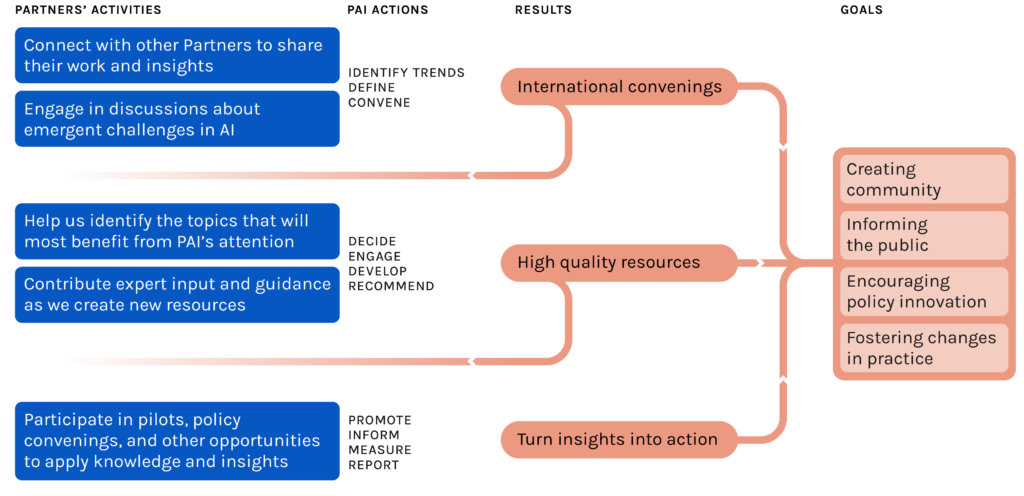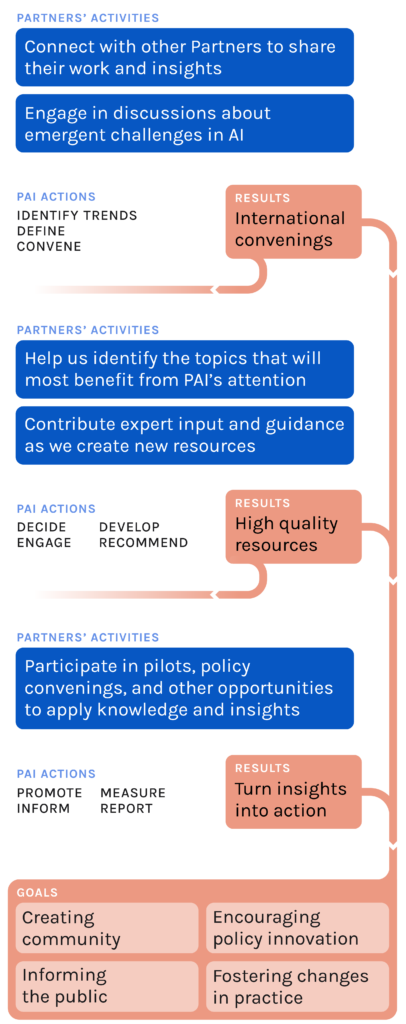Partnership on AI was founded on the belief that multistakeholder community building is critical to ensuring that AI benefits people and society.
In 2021, PAI renewed its Strategic Plan, following extensive consultations with its nearly 100 Partners worldwide. Over the next five years, PAI will align its work according to a new Theory of Change and a set of clear and accountable results to achieve its vision and mission.
With the advice of Partners, PAI has also identified clear criteria to guide the selection of questions for our global convenings and, additionally, to inform the focus of our programs.
Theory of Change


PAI will measure our success based on the ability to achieve the following results identified in our Theory of Change:
International Convenings
Important, timely convenings with diverse stakeholders across the world, including experts in relevant areas and people at highest risk of being harmed by AI applications
PAI is unique in its ability to bring together a diverse community of individuals and organizations from civil society and the media, along with, AI scientists and engineers from leading technology companies, researchers based at academic institutions and think tanks, and those most harmed or at risk of harm from AI, to have in-depth conversations about emerging, timely and important developments, sparking new connections and collaborations.
High Quality Resources
Influential, high quality, accessible, relevant PAI resources, tools and recommendations
Drawing on our convenings and ongoing work with our Partners and those potentially harmed by AI applications, we will develop a broad set of resources, tools, and recommendations that synthesize knowledge and make complex topics accessible and relevant.
Public Interest Progress Reports
Public reports that demonstrate impact and progress in Partner practice and policy, as well as public policy and understanding
PAI will issue regular reports highlighting case studies of progress and collective action. Our goal is to provide greater public accountability for the responsible development and deployment of AI, and advance action and understanding by PAI Partners, public policy makers and the broader public.
Creating long-term impact to benefit people and society
-
- An international, inclusive and equitable PAI community
- Public that is better informed about the social and societal impacts of AI
- Innovations in public policy by governments
- Changes in practice by PAI Partners in all sectors and broader communities
Criteria for Decision-Making on PAI Priorities: Convenings
PAI’s Multistakeholder Model
Topic requires the inclusion of diverse perspectives from PAI’s community of civil society and media experts, researchers based at academic institutions and think tanks, policy-makers, scientists and engineers from technology companies, and those most harmed or at risk of harm from AI.
Fundamental Sociotechnical Challenge
Topic requires an important, consequential and complex challenge where there may be significant difference of perspectives that would benefit from meeting and learning from each other. While it may be an emerging challenge, there is risk to people and society in not catalysing or developing an agenda for action.
Connects with AI research and technology expertise
There is a need for AI researchers or technologists at technology companies to bring their expertise to the topic and learn from individuals in other sectors through an open dialogue and commitment to equity.
Criteria for Decision-Making on PAI Priorities: Workstreams
There is a clear space for action and intervention with our Partners
We have identified with our Partners that we have the right capacity, skills, access to the required experts and data needed to make recommendations; we can coalesce the right stakeholders to work in this area.
We believe the issue needs our public voice
The topic is one where PAI, as a non-profit, multistakeholder organization could have something concrete to say in the public interest.
It coheres with our portfolio of work
It fills a need or gap in our project mix based on our expertise, ongoing issue spotting and the changing environment within which we work, allowing us to be proactive, agile and opportunistic when needed.
It builds our capacity for global impact and reach
Partners are committed to the workstream (e.g. funding, engagement). There is potential for recommendations to be adopted by Partners, to inform public policy-makers and advance understanding with the public.

